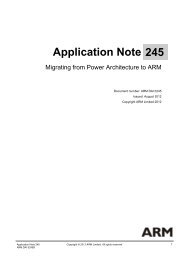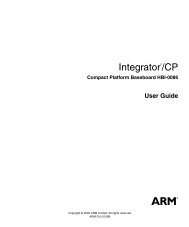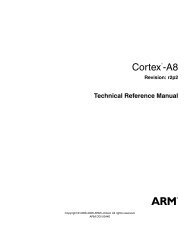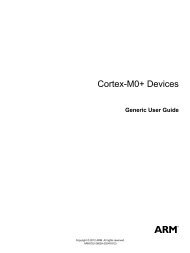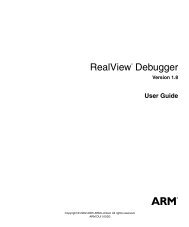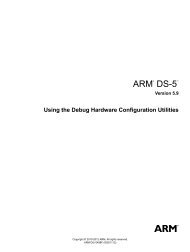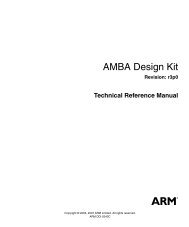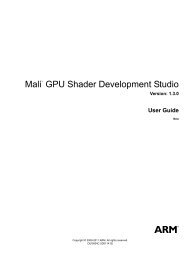- Page 1 and 2:
® ARM Compiler toolchain v4.1 for
- Page 3 and 4:
Contents ARM Compiler toolchain v4.
- Page 5 and 6:
Contents 5.19 Inline functions ....
- Page 7 and 8:
Contents 7.41 __mcall_is_virtual(D,
- Page 9 and 10:
Conventions and Feedback • the se
- Page 11 and 12:
Overview of the compiler 2.1 The co
- Page 13 and 14:
Overview of the compiler 2.3 The C
- Page 15 and 16:
Getting started with the Compiler
- Page 17 and 18:
Getting started with the Compiler 3
- Page 19 and 20:
Getting started with the Compiler
- Page 21 and 22:
Getting started with the Compiler 3
- Page 23 and 24:
Getting started with the Compiler 3
- Page 25 and 26:
Getting started with the Compiler R
- Page 27 and 28:
Getting started with the Compiler 3
- Page 29 and 30:
Getting started with the Compiler 3
- Page 31 and 32:
Getting started with the Compiler 3
- Page 33 and 34:
Getting started with the Compiler 3
- Page 35 and 36:
Getting started with the Compiler 3
- Page 37 and 38:
Getting started with the Compiler 3
- Page 39 and 40:
Getting started with the Compiler 3
- Page 41 and 42:
Getting started with the Compiler 3
- Page 43 and 44:
Getting started with the Compiler 3
- Page 45 and 46:
Chapter 4 Compiler Features The fol
- Page 47 and 48:
Compiler Features 4.1 Compiler intr
- Page 49 and 50:
Compiler Features 4.2 Performance b
- Page 51 and 52:
Compiler Features 4.4 Generic intri
- Page 53 and 54:
Compiler Features 4.6 Compiler intr
- Page 55 and 56:
Compiler Features 4.8 Compiler intr
- Page 57 and 58:
Compiler Features 4.10 Compiler sup
- Page 59 and 60:
Compiler Features 4.12 Texas Instru
- Page 61 and 62:
Compiler Features /* Declare PSR as
- Page 63 and 64:
Compiler Features 4.13.1 See also R
- Page 65 and 66:
Compiler Features 4.15 Compiler and
- Page 67 and 68:
Compiler Features Using the Linker:
- Page 69 and 70:
Compiler Features Reference Compile
- Page 71 and 72:
Compiler Features 4.19 Compiler sup
- Page 73 and 74:
Compiler Features 4.21 PreCompiled
- Page 75 and 76:
Compiler Features 4.23 PreCompiled
- Page 77 and 78:
Compiler Features Reference Compile
- Page 79 and 80:
Compiler Features 4.26 Obsolete Pre
- Page 81 and 82:
Compiler Features 4.28 Selectively
- Page 83 and 84:
Compiler Features 4.30 Message outp
- Page 85 and 86:
Compiler Features 4.32 Default comp
- Page 87 and 88:
Compiler Coding Practices • Guard
- Page 89 and 90:
Compiler Coding Practices • Exten
- Page 91 and 92:
Compiler Coding Practices 5.2 Compi
- Page 93 and 94:
Compiler Coding Practices 5.4 Selec
- Page 95 and 96:
Compiler Coding Practices In additi
- Page 97 and 98:
Compiler Coding Practices Table 5-4
- Page 99 and 100:
Compiler Coding Practices Table 5-6
- Page 101 and 102:
Compiler Coding Practices 5.9 Code
- Page 103 and 104:
Compiler Coding Practices 4. After
- Page 105 and 106:
Compiler Coding Practices 5.12 Meth
- Page 107 and 108:
Compiler Coding Practices 5.14 Meth
- Page 109 and 110:
Compiler Coding Practices 5.16 Func
- Page 111 and 112:
Compiler Coding Practices Reference
- Page 113 and 114:
Compiler Coding Practices • __val
- Page 115 and 116: Compiler Coding Practices 5.20 Comp
- Page 117 and 118: Compiler Coding Practices 5.21 Auto
- Page 119 and 120: Compiler Coding Practices 5.23 Auto
- Page 121 and 122: Compiler Coding Practices 5.25 Comp
- Page 123 and 124: Compiler Coding Practices 5.27 Inli
- Page 125 and 126: Compiler Coding Practices 5.28 Inli
- Page 127 and 128: Compiler Coding Practices 5.30 Adva
- Page 129 and 130: Compiler Coding Practices 5.32 Rele
- Page 131 and 132: Compiler Coding Practices 5.34 The
- Page 133 and 134: Compiler Coding Practices 5.36 Perf
- Page 135 and 136: Compiler Coding Practices 5.38 Unal
- Page 137 and 138: Compiler Coding Practices (LDR/STR/
- Page 139 and 140: Compiler Coding Practices • Hexad
- Page 141 and 142: Compiler Coding Practices 5.42 Exam
- Page 143 and 144: Compiler Coding Practices 5.43 Vect
- Page 145 and 146: Compiler Coding Practices 5.45 Impl
- Page 147 and 148: Compiler Coding Practices 5.47 Half
- Page 149 and 150: Compiler Coding Practices 5.49 Type
- Page 151 and 152: Compiler Coding Practices If you us
- Page 153 and 154: Compiler Coding Practices 5.52 Abou
- Page 155 and 156: Compiler Coding Practices 5.54 Iden
- Page 157 and 158: Compiler Coding Practices 5.56 Soft
- Page 159 and 160: Compiler Coding Practices 5.58 Iden
- Page 161 and 162: Compiler Coding Practices 5.59 Soft
- Page 163 and 164: Compiler Coding Practices 5.60.1 Se
- Page 165: Compiler Coding Practices 5.62 // c
- Page 169 and 170: Compiler Coding Practices 5.66 Flex
- Page 171 and 172: Compiler Coding Practices 5.68 inli
- Page 173 and 174: Compiler Coding Practices 5.70 Macr
- Page 175 and 176: Compiler Coding Practices 5.72 New
- Page 177 and 178: Compiler Coding Practices 5.74 Rest
- Page 179 and 180: Compiler Coding Practices 5.76 Comp
- Page 181 and 182: Compiler Coding Practices 5.78 Exte
- Page 183 and 184: Compiler Coding Practices 5.80 snp
- Page 185 and 186: Compiler Coding Practices 5.82 wid
- Page 187 and 188: Chapter 6 Compiler Diagnostic Messa
- Page 189 and 190: Compiler Diagnostic Messages 6.2 Se
- Page 191 and 192: Compiler Diagnostic Messages 6.4 Pr
- Page 193 and 194: Compiler Diagnostic Messages 6.6 Co
- Page 195 and 196: Using the Inline and Embedded Assem
- Page 197 and 198: Using the Inline and Embedded Assem
- Page 199 and 200: Using the Inline and Embedded Assem
- Page 201 and 202: Using the Inline and Embedded Assem
- Page 203 and 204: Using the Inline and Embedded Assem
- Page 205 and 206: Using the Inline and Embedded Assem
- Page 207 and 208: Using the Inline and Embedded Assem
- Page 209 and 210: Using the Inline and Embedded Assem
- Page 211 and 212: Using the Inline and Embedded Assem
- Page 213 and 214: Using the Inline and Embedded Assem
- Page 215 and 216: Using the Inline and Embedded Assem
- Page 217 and 218:
Using the Inline and Embedded Assem
- Page 219 and 220:
Using the Inline and Embedded Assem
- Page 221 and 222:
Using the Inline and Embedded Assem
- Page 223 and 224:
Using the Inline and Embedded Assem
- Page 225 and 226:
Using the Inline and Embedded Assem
- Page 227 and 228:
Using the Inline and Embedded Assem
- Page 229 and 230:
Using the Inline and Embedded Assem
- Page 231 and 232:
Using the Inline and Embedded Assem
- Page 233 and 234:
Using the Inline and Embedded Assem
- Page 235 and 236:
Using the Inline and Embedded Assem
- Page 237 and 238:
Using the Inline and Embedded Assem
- Page 239 and 240:
Using the Inline and Embedded Assem
- Page 241 and 242:
Using the Inline and Embedded Assem
- Page 243 and 244:
Using the Inline and Embedded Assem
- Page 245 and 246:
Using the Inline and Embedded Assem
- Page 247 and 248:
Using the Inline and Embedded Assem
- Page 249 and 250:
Using the Inline and Embedded Assem
- Page 251:
Using the Inline and Embedded Assem



